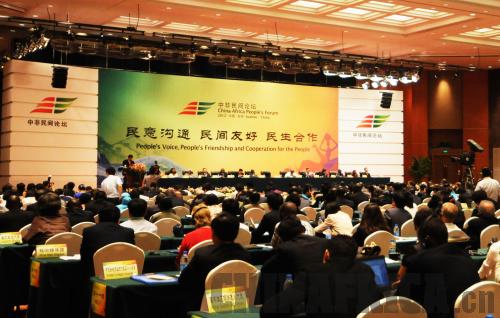|
 |
|
KEEP IT LOCAL: Second China-Africa People's Forum in Suzhou City in June 2012 shows the big benefits of local level cooperation in bilateral ties (XINHUA) |
Luanda, the capital of Angola in West Africa, and Suzhou on the shores of Taihu Lake in east China, are separated geographically by thousands of miles, but a church under construction in Luanda links the two cities. Jiangsu China Science Intelligent Engineering Co. Ltd. (SCSIC), a leading provider of intelligence systems in Jiangsu Province, is providing the installation service of the audio and video systems for the church, a landmark project in the continent.
In the Internet age, it is reasonable to find contracts reached and signed online. This was true for the cooperation reached between the Angola church and SCSIC in 2011. The Angola church investors found out about the high quality installation of the audio and video system at Suzhou Dushu Lake Church by SCISC through online research. Within 15 days, the two sides reached an agreement via the Internet. The $20 million church project was launched this March when SCISC sent four Chinese engineers to Angola.
Suzhou, one of China's oldest and most beautiful cities, became the top recipient of foreign capital in the past several years, surpassing even Shanghai. Private enterprises there, like SCSIC, are also looking outside China's borders in a big way, with an increasing number of enterprises investing in Africa.
By the end of May 2012, the volume of Suzhou's accumulative investment in Africa had reached $334 million, with investment projects in 16 countries in the continent.
Looking outwards
The Eastern Industrial Zone, about 35 km south of Addis Ababa, the capital of Ethiopia, is being funded and developed by the Municipal Government of Suzhou. The Ethiopian Government has also chosen the industrial zone as a priority project in their industrial development plan. To date, the industrial zone has contributed over $5 million in tax revenues for the local government, while creating more than 900 jobs.
Suzhou enterprises' investment in Africa has impacted positively on the growth of Suzhou-African trade volume. The bilateral trade has grown 16.7 percent year on year to $1.197 billion from January to May this year.
"The increasing economic and cultural importance of the China-Africa relationship means our company sees Africa as an important overseas investment market," said Qian Xiaoqin, Executive Deputy General Manager of International Business Division of Hengtong Group, Suzhou-based high-tech enterprise specializing in R&D and manufacturing of optical fiber and cable. According to Qian, high-quality Chinese products at lower prices are always welcomed by African consumers, attested to by the fact that the company's exports to Africa account for about 30 percent of its total exports since it entered the African market in 2000.
A hand up
SCSIC and Hengtong Group's international move are the choices many Suzhou enterprises are making. But getting involved in reshaping Africa's infrastructure is not a recent development for China. Since the 1970s, Suzhou's enterprises have participated in the construction of infrastructure in Africa. Nowadays, most of the city's investments in Africa have been in the project contracting business.
Local government support is also the key to the successful international operation of enterprises. Suzhou had launched a series of overseas trade and investment promotion workshops in African countries, such as Kenya and Egypt, published Investment Guide in Egypt, South Africa, and Kenya, and held investment environment information seminars to make Chinese enterprises understand more about the investment environment and legal systems in related countries.
Meanwhile, to reduce the risks of investing abroad, in March 2012 Sinosure, China's only policy-oriented insurance company specializing in export credit insurance, offered an all-round insurance service to Jiangsu Etern Co. Ltd. This included credit insurance, overseas investment insurance and financial services in order to heighten Chinese enterprise's exports and support the enterprise as it pursues its "going global" strategies.
|